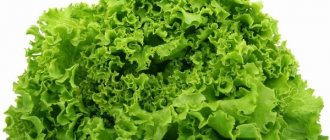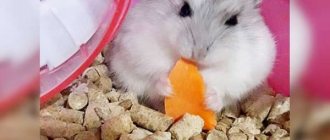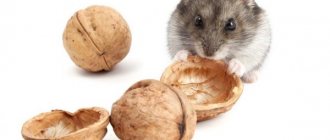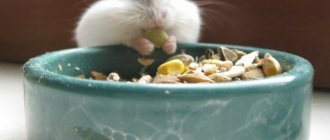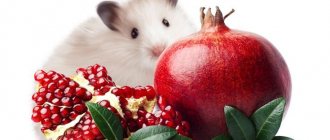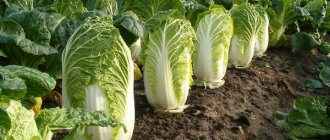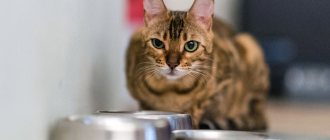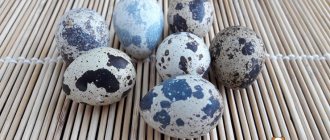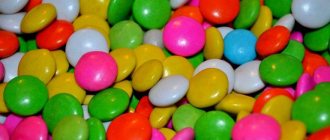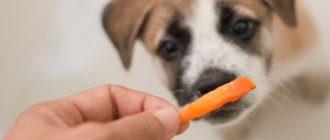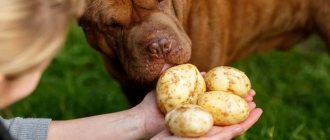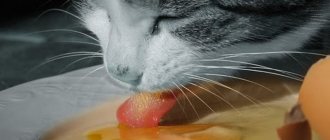Can hamsters eat peas, beans and corn? This is an important question when choosing a diet for your furry friend. Cereals and grain mixtures are the main component of a hamster’s diet. But it is important to feed your rodent a variety of foods to keep your pet healthy and active. You should familiarize yourself with the basic recommendations for creating a hamster’s diet so as not to accidentally harm it.
Peas in a hamster's diet
Often, hamster owners do not include peas in their diet, complaining of its negative effects on the digestive system. However, the product is important for diversifying a hamster’s diet, containing many beneficial microelements.
You can give your hamster peas in different ways:
- Boiled. It is recommended to cook peas for elderly pets, or if they have illnesses. It does not take long to cook; 15 minutes of cooking after boiling water is enough to bring it to a soft state. Otherwise, when it is cooked for a long time, vitamins are lost.
- Dry. An alternative to buckwheat, dry peas are also included in the diet, but be careful with young individuals - this can be dangerous for their teeth.
- Fresh. Fresh peas have much more vitamins than dried peas. In addition, your hamster can eat it with the pod, which will supplement the diet with vitamins.
- Soaked. To improve your hamster's digestive system, you can give him soaked peas. You should fill it with warm water for several hours.
The only limitation is that canned peas cannot be given to hamsters, due to the preservatives and spices present in the brine.
Carefully introduce chickpeas into your diet, which contain a large number of trace elements, including phytic acid, which binds calcium, iron, zinc and other trace elements, preventing them from being absorbed, which leads to the risk of osteoporosis and rickets. To prevent the formation of diseases, legumes should be soaked overnight.
Can hamsters eat peas?
Peas are on the list of approved foods for hamsters. Rodents can be given dry peas, softened with hot water or fresh. Whole pea pods are also allowed. Djungarian hamsters prefer fresh grains.
Peas can be cooked - boil for 10 minutes and cool well. Hot peas can burn your pet. It is forbidden to add spices, since animals are not able to digest salty, hot or spicy foods.
Many specialized rodent foods contain dried peas. Treat your homa to a similar mixture or add dried chickpeas to your cereal feed yourself.
Beans
Legumes are often a staple in a hamster's diet, including beans. It can be given in any form, including dry, fresh and thawed. However, it has the best effect on your pet’s health when consumed fresh, as it contains more nutrients.
IMPORTANT! Not all beans are good for your hamster. Red beans (kidni) can only harm him, since their toxicity will lead to deterioration of the animal’s digestion, which is why it should not be consumed.
Green beans are also suitable for consumption. It is most often found frozen, but pets prefer it fresh because of the juice it contains. Before serving defrosted green beans, check its composition; it should not contain any preservatives, which are often added to improve the taste of the product, and additives are dangerous for rodents.
Before giving it to the hamster, it is better to soak the beans, because this way they are better absorbed, giving useful microelements to the rodent’s body. For soaking, one night and water at room temperature is enough.
Tangerine or orange peel
Can hamsters eat tangerine peels or oranges? Absolutely not. Since almost all imported fruits and vegetables are treated with various chemicals for longer storage, even thorough washing will not get rid of them completely. In addition, a hamster may be allergic to essential oils. Do you want your pet to suffer from poisoning or allergies? So, don’t give citrus peels or pulp.
Human and hamster organisms are structured completely differently. And the food that is consumed by a person and does not cause any reactions in his digestion can greatly harm small pets, regardless of size - larger Syrian or dwarf Djungarian hamsters. Treat your hamster like a small child and do not feed him anything, because his health and well-being depend on it. Now you know for sure the answer to the question “can you give tangerines to hamsters” is negative!
Did you like the article? Share with friends: [supsystic-social-sharing id=”1"]
- Related Posts
- Can hamsters eat persimmons?
- Can hamsters eat beets?
- Can hamsters eat kiwi?
« Previous entry
Corn
To diversify your hamster's diet, you can give him corn. But keep in mind that it cannot be used as preserved food. It is dangerous for hamsters to eat canned corn due to the preservatives contained in the product. Artificial additives and flavors become poison for their body.
ATTENTION! It is better not to give corn to Djungarian hamsters, this is due to their predisposition to obesity and high sugar content.
You can feed your hamster corn in any other form:
- Dry. Dry grains are good for hamsters to eat, but they are reluctant to eat them due to the lack of special taste.
- Fresh. Grains are very useful for a hamster, as they contain 26 elements of the periodic table, which makes it possible to treat many diseases of the animal. They're great for variety, but don't feed them too much as fresh corn contains a lot of natural sugar, which can be harmful to your pet. The cobs and leaves are also suitable for consumption; they contain many vitamins that are beneficial for pets of any age.
- Boiled. Despite the fact that after heat treatment some of the vitamins are lost, it is also possible to give grains to hamsters in this form. To do this, you need to cook them for up to 20 minutes, otherwise they become tough, less tasty and healthy.
- Soaked. It is preferable to feed soaked grains, this way all the beneficial substances and microelements in the product are preserved. In addition, hamsters will eat soaked corn much more readily than dry corn.
- Corn porridge. You can give it to hamsters every day, regardless of age and health status. You need to cook the porridge in water, without adding spices or oil.
Corn is healthy, which is why it is often recommended by veterinarians to treat diseases associated with digestive problems. You can take it as a preventive measure for cancer; for this you need to cook porridge, or mix different types of grains.
Corn sticks, cereal and popcorn
Corn is good for hamsters, but you should be careful with the products made from it, as they are harmful due to the high content of additives.
Because hamsters should not be given any spices, corn sticks and flakes should not be given to rodents. A high content of artificial sugar can lead to the development of diabetes in a rodent, which often results in complications and early death.
Popcorn is included in some foods and can also be prepared at home without the use of additives. However, the store-bought product is dangerous for hamsters due to the content of salt, sugar, preservatives and oil.
Citrus composition
Tangerines, oranges and lemons are some of the most popular fruits that can be purchased at almost any time of the year. Citrus fruits contain organic acids, sugars, ascorbic acid and many other vitamins and minerals. And the peel contains essential oils. It would seem that these fruits should only bring benefits.
But in fact, the organic acid of citrus fruits can irritate the mucous membranes of the stomach and intestines, and the high content of vitamin C can lead to hypervitaminosis. In addition, many people experience an allergic reaction after eating these fruits. And if a person does not experience a reaction from one slice of orange or tangerine, then eating the same amount of these fruits by a hamster can provoke a severe digestive disorder or lead to death.
Can hamsters chew orange peels?
The peel of oranges and tangerines is treated with various chemical compounds - fungicides, wax. Washing thoroughly with soap does not remove these substances.
Once in the animal's body, the chemicals cause food poisoning. The disease is manifested by drooling, redness of the eyes and mouth, and decreased body temperature.
If prompt action is not taken, your pet may experience convulsions and begin to choke.
Citrus peels contain essential oil compounds that can cause allergies in your pet.
The skins of oranges, tangerines, and lemons are just as harmful to animals as the pulp of the fruit.
Why should you not give your hamster lemon and lime?
No no! You can't do this. Still small!
- A large amount of citric acid has a bad effect on the enamel of a hamster's teeth. Yes, you need to grind it down regularly, but just grind it down, and not destroy it at all.
- Risk of ulcers.
- Citrus seeds contain the glycoside amygdalin, which, when broken down, forms poisonous hydrocyanic acid.
We're done with the sour ones. Next up are the sweet ones. These are no longer citrus fruits, but we often buy them together. We're talking about nectarines, pineapples and mangoes.
Can a hamster eat corn?
Of all cereals, corn and corn-based products are subject to the greatest doubts among owners. The following will be useful for hamsters:
- fresh corn;
- dry grains;
- boiled cobs.
If your pet has difficulty chewing dried grains, they should be softened by leaving them in hot water for a short time.
Boiled corn can be offered to hamsters if it is prepared without additives (salt, sugar). Before feeding, it must be thoroughly cooled to protect your pet from burns.
Can hamsters eat canned corn?
Any canned food is harmful to rodents. During production, various additives are used to add flavor to the product and extend shelf life. Preservatives can cause various animal diseases.
Is it possible for Syrian hamsters and dwarfs?
It is difficult to say whether it is possible to feed a particular breed of hamster with a pear. This fruit is included in the animal’s diet, so you can safely put it in the feeder. Some Syrians will eat this delicacy well, while others will only sniff it. For them, a pear is as useful as if it were given to a Djungarian hamster. It is recommended to give it to Djungarians regularly, but in small portions, so as not to cause digestive problems.
With its diuretic effect, this fruit helps well with diabetes, washing away its excess from the body. Plant sugars will have a more positive effect than harmful chocolate.
Can a hamster have nectarine?
Nectarine is relatively harmless for a hamster. But we remember that Djungarian hamsters cannot have sweets. Therefore, if you give nectarine to a hamster, then firstly, a very small piece, and secondly, make sure that the pet does not drag it into the house. Nectarine is a perishable product. The animal will simply be poisoned by rotten nectarine. You can give nectarine to your hamster no more than once a week. We remove the bone and throw it away.
